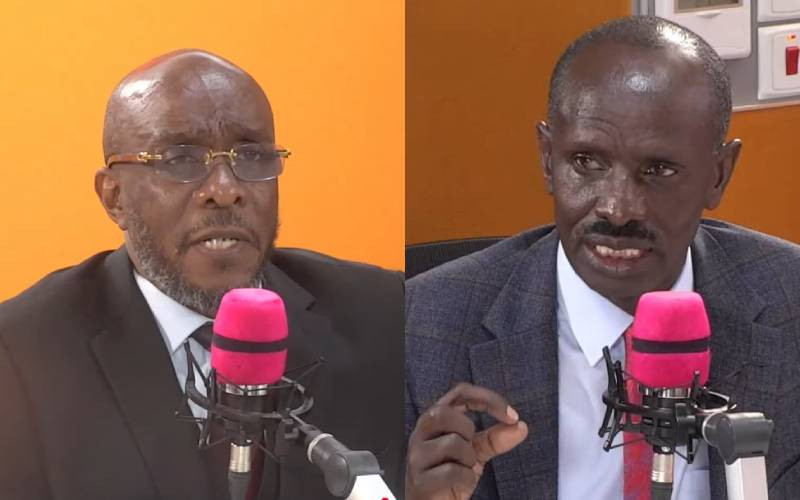Criticisms against Parliament are growing following President William Ruto’s revelation that some parliamentary committees have been demanding bribes from state officials scheduled to appear for questioning.
Speaking on Spice FM on Thursday, August 14, former nominated MP Wilson Sossion warned that the practice undermines the legislature’s role in holding the executive to account.
He blamed the exchange of favors for Parliament’s failure to conduct thorough investigations, including superficial scrutiny of crucial Auditor General’s reports.
“When a President makes a statement, it is not propaganda. A President has state infrastructure to get accurate information on what happens in all sections of government,” said Sossion.
“If a culture of inducing committees monetarily remains in place, then it is a threat to the governance in the country…It is true, it goes on, it’s a fact. Let’s agree there is a problem. It does happen and that must stop,” he added.
Follow The Standard
channel
on WhatsApp
Political analyst Barack Muluka also condemned the “protection fee” culture, saying the Executive lacked moral authority to criticise it.
He argued that the Kenya Kwanza administration had enabled the practice by disbursing large sums ahead of key votes and to secure support.
“Parliament is whipped in the State House. The Legislature is not checking the Executive. The committees are extortion forums,” said Muluka.
“When they hear something has happened, say a plane has crashed in Juja or that some people are scanning Kenyans’ eyes at the Kenyatta International Convention Centre (KICC), they quickly summon the cabinet secretaries and before you know it the committee chairman is pacing up and down corridors of ministries to collect protection fees,” he claimed.
Some MPs have however, accused Ruto of dishonesty, claiming the Executive was complicit.
“It is known that when the Senate is impeaching governors, lots of money changes hands. How did we impeach Riggy G (Rigathi Gachagua)? The executive is the giver of the bribe,” claimed Kisumu East MP Shakeel Shabir while appearing on a local TV station.
Both Sossion and Muluka called for tougher laws to curb corruption, warning that bribery should be stigmatised and that Kenyans must be discouraged from demanding payments for votes during elections, which further entrenches the vice.
Follow The Standard
channel
on WhatsApp
Criticisms against Parliament are growing following President William Ruto’s revelation that some parliamentary committees have been demanding bribes from state officials scheduled to appear for questioning.
Speaking on Spice FM on Thursday, August 14, former nominated MP Wilson Sossion warned that the practice undermines the legislature’s role in holding the executive to account.
He blamed the exchange of favors for Parliament’s failure to conduct thorough investigations, including superficial scrutiny of crucial Auditor General’s reports.
“When a President makes a statement, it is not propaganda. A President has state infrastructure to get accurate information on what happens in all sections of government,” said Sossion.
“If a culture of inducing committees monetarily remains in place, then it is a threat to the governance in the country…It is true, it goes on, it’s a fact. Let’s agree there is a problem. It does happen and that must stop,” he added.
Follow The Standard
channel
on WhatsApp
Political analyst Barack Muluka also condemned the “protection fee” culture, saying the Executive lacked moral authority to criticise it.
He argued that the Kenya Kwanza administration had enabled the practice by disbursing large sums ahead of key votes and to secure support.
“Parliament is whipped in the State House. The Legislature is not checking the Executive. The committees are extortion forums,” said Muluka.
“When they hear something has happened, say a plane has crashed in Juja or that some people are scanning Kenyans’ eyes at the Kenyatta International Convention Centre (KICC), they quickly summon the cabinet secretaries and before you know it the committee chairman is pacing up and down corridors of ministries to collect protection fees,” he claimed.
Some MPs have however, accused Ruto of dishonesty, claiming the Executive was complicit.
“It is known that when the Senate is impeaching governors, lots of money changes hands. How did we impeach Riggy G (Rigathi Gachagua)? The executive is the giver of the bribe,” claimed Kisumu East MP Shakeel Shabir while appearing on a local TV station.
Both Sossion and Muluka called for tougher laws to curb corruption, warning that bribery should be stigmatised and that Kenyans must be discouraged from demanding payments for votes during elections, which further entrenches the vice.
Follow The Standard
channel
on WhatsApp
By Denis Omondi
